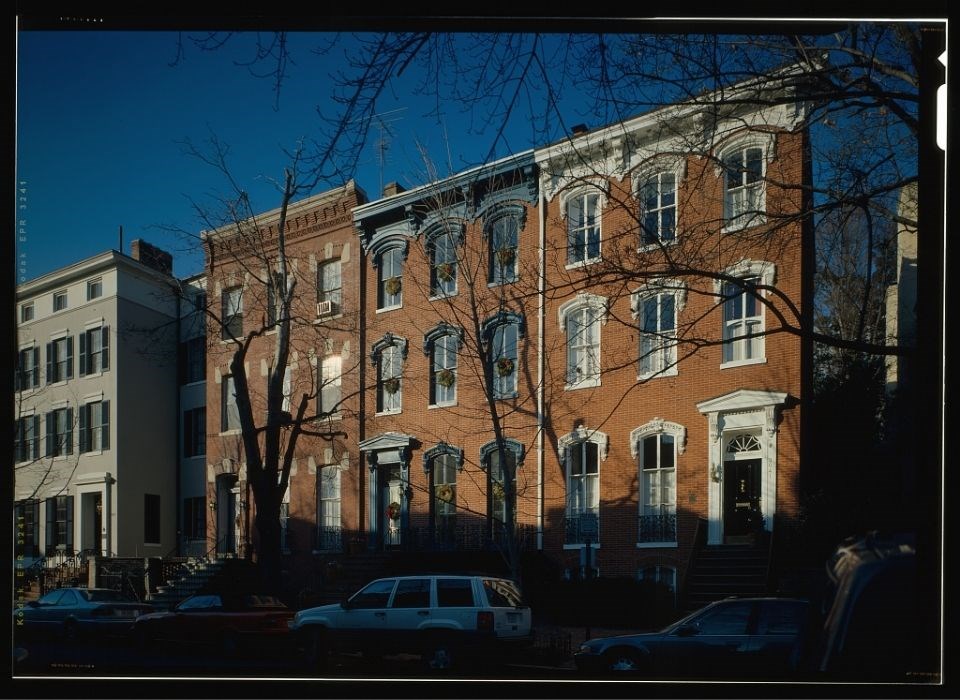Reference address: 3041 N St NW, Washington, DC 20007
Walking directions: Continue walking to the buildings 3041-3045 St NW.
These three buildings comprise Wheatley Row, finished in 1859. The Wheatley and Gordon families lived here during the war. Although both families had southern sympathies, William Gordon Sr. remained in his U.S. government job. He was commended upon retirement as being "one of the oldest and most valuable of government employees".
His oldest son, William Gordon, Jr. had a Ph.D. and taught mathematics. Although he longed to help the rebel cause, he respected his parents' wishes and initially refrained from fighting. One day he got into an altercation with a federal officer. Because he refused to take the oath of allegiance to the government, he was jailed in Baltimore. He was exchanged for a Union prisoner and sent south. He became a lieutenant with the Confederate army and worked as an engineer. At war's end he returned to D.C. His brother, J. Holdsworth Gordon, recounts an interesting experience they had shortly after his return:
"He and I went to the theatre. As he had not brought much clothing with him on his return he had a short gray coat, his uniform coat, minus military buttons. The theatre was crowded, the audience being mainly made up of Union soldiers returning to their homes. As we approached at the head of the aisle Will's gray caught the eye of the men and a yell went up 'Come down here Johnnie and we will give you as seat!' I was deadly uneasy, but we accepted the invitation, the soldiers made room for us, and we were treated grandly. I then learned that the man who fights is generally magnanimous and never bears ill will toward the brave foe he has met on the battlefield."
William Gordon Jr. received his pardon August 8th, 1865. His brother also told how the war affected his neighbors the Wheatley's.
"When the war had been going on for a year or two, my neighbor Walter Wheatley who was a strong, powerful fellow, decided he would run away and join his brothers Charles and Francis, they being with Lee in the Army of Northern Virginia. I well remember the secrecy with which we purchased pipes, tobacco and other such belongings to army life and the deep sorrow I felt when we bade each other goodbye. He had to steal through the lines, but was successful and became a courier in Mosby's Command. Shortly after he reached Virginia, his brother Francis was killed in a cavalry fight, and Walter conceived the idea of bringing his watch and picture home to Mrs. Wheatley. He reached home safely and startled his family by appearing in their midst one evening. It was necessary to conceal him until he got ready to return to his command as if captured he might be executed as a spy. I was informed of his presence and lost no time in joining him at his home.
"On the next day after his arrival he and I were in his room, listening to the startling stories he was telling of his army experiences when one of the family appeared at his door with blanched face, exclaiming 'run, run and hide, the house is surrounded!'
"I immediately ran out of the room jumping onto a back porch and then to the roof of our house, down and out the front door, joining the growing crowds on N Street to see what the soldiers were after. It was a company of German troops who were part of the provost squad in charge of Georgetown. A slave of Mr. Wheatley's had seen Walter come in and running off to the guard, had given the information. Walter ran from his room and crawled up into a large empty water tank, when the same slave appeared and pointing out the hiding place, exclaimed 'he's in there!' The soldiers thereupon began poking their bayonets into the dark tank, and Walter had to come out or be stabbed to death. He was seized and subsequently incarcerated in the old Capitol Prison. Fears were entertained that he would be hung as a spy, but thanks to the influence of friends of the family he was allowed to give parole and was released. This he did reluctantly, but it was just as well as the war soon ended."

